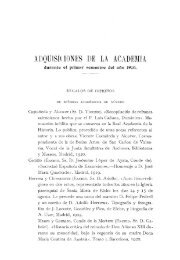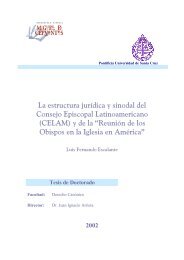Create successful ePaper yourself
Turn your PDF publications into a flip-book with our unique Google optimized e-Paper software.
Anales galdosianos [Publicaciones periódicas]. Año XII, 1977<br />
anything, therefore, it is surely an overdose of pathos. Moreover, is it entirely true to say that <strong>Galdós</strong><br />
attacks Don José's dignity as a person? The hostile, dehumanising stance implicit in such a procedure<br />
is surely contradicted, to take but one example, by the manifest sympathy and compassion which<br />
<strong>Galdós</strong> shows towards his character at the latter's death. The reality is that <strong>Galdós</strong>' portrait of Don<br />
José is much more finely balanced than this criticism would tend to suggest.<br />
<strong>Galdós</strong> portrays Don José, as he portrays Isidora, in a fundamentally dualistic manner -a dualism<br />
neatly expressed in the initial description of Don José, when <strong>Galdós</strong> tells<br />
Era el hombre mejor del mundo. Era un hombre que no servía para nada.<br />
(p. 123)<br />
Don José's character is made up of two conflicting strands: on the one hand, his uselessness,<br />
ridiculousness and inadequacy, and, on the other, certain more positive qualities, among which<br />
inoffensiveness and selflessness occupy a prominent position. The same dualism characterises his<br />
relationship with Isidora. If his vision of himself as a kind of romantic paladin is incongruous, and<br />
therefore ludicrous, the fact remains that Don José acts out his self-imposed role with a selflessness<br />
and nobility which makes his dog-like devotion touching in spite of everything. There are two obvious<br />
ways in which such a character could develop. By emphasising Don José's inadequacy -in other words<br />
by effectively ridiculing or vilifying his character- <strong>Galdós</strong> could underscore the ludicrousness of his<br />
illusions. Alternatively, by stressing the nobility of Don José's conduct, he could play up the pathos<br />
inherent in his personal inadequacy. <strong>Galdós</strong>, however, eschews both of these obvious scenarios and<br />
manages instead to strike a balance between them, pointing out the unreality of Don José's illusions<br />
without denigrating him as a character and arousing sympathy for his positive qualities without<br />
provoking an excess of pathos. Here <strong>Galdós</strong>' use of humour and irony is at its most effective, the<br />
warmth and indulgence of the humour retains our sympathy for the character, while the insulating<br />
effect of irony guards against the obvious pitfall of sentimentality, this restraint making possible the<br />
controlled pathos of his death scene.<br />
Don José's insanity, ostensibly a mixture of senile dementia and alcoholism, is brought on by the<br />
burden of his frustrations, disappointments and humiliation. This much clearly recalls many of the<br />
victims of psychological frustration in the primera época (e. g. Daniel Morton in Gloria or Martín<br />
Muriel in El Audaz ). There is, however, a fundamental difference in the case of Don José. Characters<br />
like Morton and Muriel are essentially social casualties whose aspirations or natural psychic drives<br />
are thwarted by the prevailing social system or ideology and whose tragic fate, therefore, implicitly<br />
stresses the need for a new and more fulfilling social order. The tragedy of Don José, on the other hand,<br />
47

















